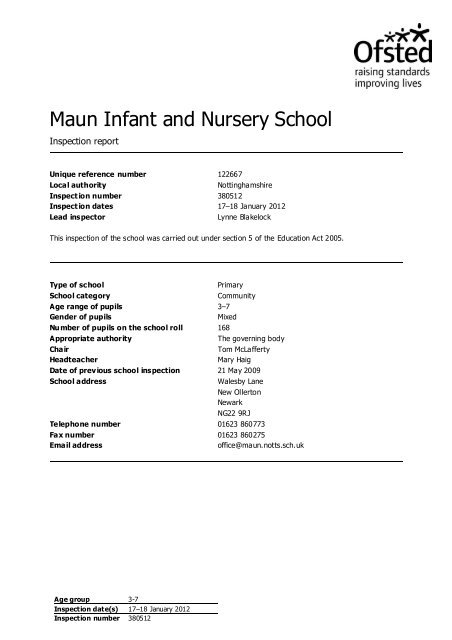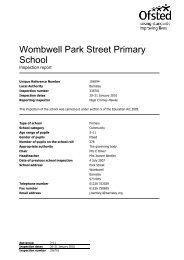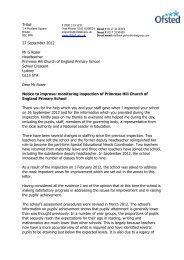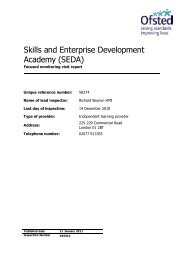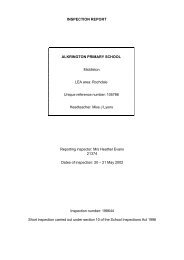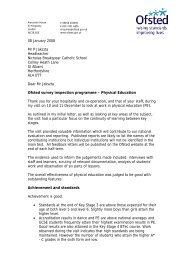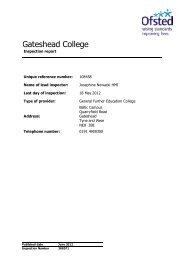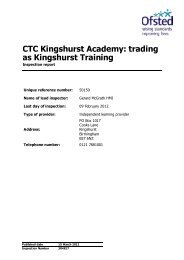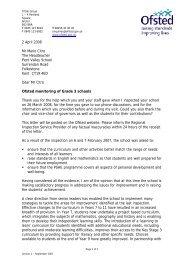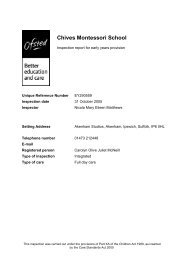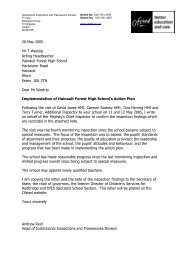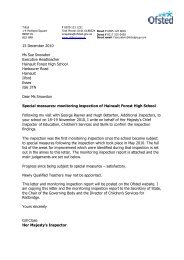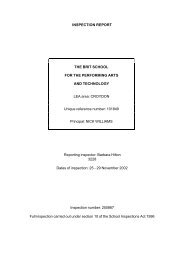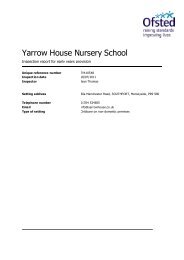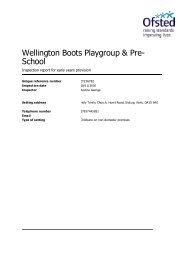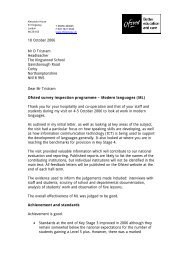Maun Infant and Nursery School - Ofsted
Maun Infant and Nursery School - Ofsted
Maun Infant and Nursery School - Ofsted
Create successful ePaper yourself
Turn your PDF publications into a flip-book with our unique Google optimized e-Paper software.
<strong>Maun</strong> <strong>Infant</strong> <strong>and</strong> <strong>Nursery</strong> <strong>School</strong><br />
Inspection report<br />
Unique reference number 122667<br />
Local authority Nottinghamshire<br />
Inspection number 380512<br />
Inspection dates 17–18 January 2012<br />
Lead inspector Lynne Blakelock<br />
This inspection of the school was carried out under section 5 of the Education Act 2005.<br />
Type of school Primary<br />
<strong>School</strong> category Community<br />
Age range of pupils 3–7<br />
Gender of pupils Mixed<br />
Nu mber of pupils on the school roll 168<br />
Appropriate authority The governing body<br />
Chair Tom McLafferty<br />
Headteacher Mary Haig<br />
Date of previous school inspection 21 May 2009<br />
<strong>School</strong> address Walesby Lane<br />
Age group 3-7<br />
Inspection date(s) 17–18 January 2012<br />
Inspection number 380512<br />
New Ollerton<br />
Newark<br />
NG22 9RJ<br />
Telephone number 01623 860773<br />
Fax number 01623 860275<br />
Email address office@maun.notts.sch.uk
Inspection report: <strong>Maun</strong> <strong>Infant</strong> <strong>and</strong> <strong>Nursery</strong> <strong>School</strong>, 17–18 January 2012 2 of 12<br />
The Office for St<strong>and</strong>ards in Education, Children's Services a nd Skills (<strong>Ofsted</strong>) regulates <strong>and</strong> inspects to<br />
achieve excellence in the care of children <strong>and</strong> young people, <strong>and</strong> in education <strong>and</strong> skills for learners of<br />
all ages. It regulates <strong>and</strong> inspects childcare <strong>and</strong> children's social care, <strong>and</strong> inspects the Children <strong>and</strong><br />
Family Court Advisory Support Service (Cafcass), schools, colleges, initial teacher training, work-based<br />
learning <strong>and</strong> skills training, adult <strong>and</strong> community learning, <strong>and</strong> education <strong>and</strong> training in prisons <strong>and</strong><br />
other secure establishments. It assesses council children’s services, <strong>and</strong> inspects services for looked<br />
after children, safeguarding <strong>and</strong> child protection.<br />
Further copies of this report are obtainable from the school. Under the Education Act 2005, the school<br />
must provide a copy of this report free of charge to certain categories of people. A charge not<br />
exceeding the full cost of reproduction may be made for any other copies supplied.<br />
If you would like a copy of this document in a different format, such as large print or Braille, please<br />
telephone 0300 123 4234, or email enquiries@ofsted.gov.uk.<br />
You may copy all or parts of this document for non-commercial educational purposes, as long as you<br />
give details of the source <strong>and</strong> date of publication <strong>and</strong> do not alter the information in any way.<br />
To receive regular email alerts about new publications, including survey reports <strong>and</strong> school inspection<br />
reports, please visit our website <strong>and</strong> go to ‘Subscribe’.<br />
Piccadilly Gate<br />
Store St<br />
Manchester<br />
M1 2WD<br />
T: 0300 123 4234<br />
Textphone: 0161 618 8524<br />
E: enquiries@ofsted.gov.uk<br />
W: www.ofsted.gov.uk<br />
© Crown copyright 2012<br />
You can use Parent View to give <strong>Ofsted</strong> your opinion on your child’s school.<br />
<strong>Ofsted</strong> will use the information parents <strong>and</strong> carers provide when deciding<br />
which schools to inspect <strong>and</strong> when.<br />
You can also use Parent View to find out what other parents <strong>and</strong> carers thi nk<br />
about schools in Engl<strong>and</strong>. You can visit www.parentview.ofsted.gov.uk, or<br />
look for the link on the main <strong>Ofsted</strong> website: www.ofsted.gov.uk
Inspection report: <strong>Maun</strong> <strong>Infant</strong> <strong>and</strong> <strong>Nursery</strong> <strong>School</strong>, 17–18 January 2012 3 of 12<br />
Introduction<br />
Inspection team<br />
Lynne Blakelock<br />
Debbie Vials<br />
Additional inspector<br />
Additional inspector<br />
This inspection was carried out with two days’ notice. The inspectors observed six<br />
teachers in 12 lessons, over approximately six hours. As well as observing classes<br />
over the full or part-lesson, inspectors spent time watching the learning of pupils in<br />
small groups <strong>and</strong> individually <strong>and</strong> discussed their learning with them. The inspectors<br />
held meetings with groups of pupils, with the leadership team <strong>and</strong> with<br />
representatives of the governing body. Inspectors took account of the responses to<br />
the on-line questionnaire (Parent View) in planning the inspection, observed the<br />
school’s work, <strong>and</strong> looked at the school’s data about the achievement of all groups of<br />
pupils, its improvement planning <strong>and</strong> samples of pupils’ work. They analysed 51<br />
questionnaires returned by parents <strong>and</strong> carers.<br />
Information about the school<br />
This is a smaller than average school, compared to others of its type. Most pupils are<br />
of White British heritage. The proportion of pupils known to be eligible for free school<br />
meals is below average. A below average proportion has special educational needs<br />
<strong>and</strong>/or disabilities, of which most are moderate learning difficulties.<br />
The school is part of a family of seven schools which work together to share<br />
resources <strong>and</strong> expertise. Since the last inspection, the school has established a<br />
leadership team of four teachers to support the headteacher.
Inspection report: <strong>Maun</strong> <strong>Infant</strong> <strong>and</strong> <strong>Nursery</strong> <strong>School</strong>, 17–18 January 2012 4 of 12<br />
Inspection judgements<br />
Overall effectiveness<br />
Achievement of pupils<br />
Quality of teaching<br />
Behaviour <strong>and</strong> safety of pupils<br />
Leadership <strong>and</strong> management<br />
Key findings<br />
� This is a satisfactory school. Children achieve satisfactorily through the Early<br />
Years Foundation Stage <strong>and</strong> through Key Stage 1 in reading, writing <strong>and</strong><br />
mathematics. They reach average levels in reading, writing <strong>and</strong> mathematics by<br />
the end of Year 2.<br />
� The quality of teaching is satisfactory. While some teaching is good, overall it is<br />
satisfactory. It results in satisfactory progress over time. Planning does not<br />
always take into account the levels at which pupils are working to provide<br />
accurate challenge in order to accelerate pupils’ progress. Similarly while the<br />
point of learning is often very focused, it is not always so. Some marking <strong>and</strong><br />
oral feedback ensures that pupils know exactly what to do to move their<br />
learning forward, but this information is not always given, or is sometimes not<br />
clear enough.<br />
� Pupils’ behaviour is good from the Early Years Foundation Stage onwards. They<br />
feel safe in school <strong>and</strong> well cared for. Pupils’ attendance has remained average<br />
for several years <strong>and</strong> while strategies are in place to improve it, they do not<br />
sufficiently involve parents <strong>and</strong> carers, ensure that pupils know the importance<br />
of very regular attendance or involve them in managing their own attendance<br />
rates.<br />
� Leadership <strong>and</strong> management are satisfactory. The leadership team is showing<br />
emerging good practice in addressing its areas of responsibility but there are<br />
gaps in the monitoring of key aspects of learning <strong>and</strong> other outcomes. In<br />
particular, data relating to pupils’ achievement through the school, which is<br />
collected regularly, has not been evaluated thoroughly enough recently to<br />
ensure its accuracy, consistency <strong>and</strong> effectiveness in supporting individual<br />
pupils’ progress.<br />
<strong>School</strong>s whose overall effectiveness is judged satisfactory may receive a monitoring<br />
visit by an <strong>Ofsted</strong> inspector before their next section 5 inspection.<br />
3<br />
3<br />
3<br />
2<br />
3
Inspection report: <strong>Maun</strong> <strong>Infant</strong> <strong>and</strong> <strong>Nursery</strong> <strong>School</strong>, 17–18 January 2012 5 of 12<br />
What does the school need to do to improve further?<br />
� Raise st<strong>and</strong>ards <strong>and</strong> accelerate progress from the Early Years Foundation Stage<br />
onwards, through ensuring that;<br />
tasks always provide an accurate match of challenge to pupils’ needs<br />
there is always a specific focus to pupils’ learning, which they know <strong>and</strong><br />
underst<strong>and</strong><br />
written <strong>and</strong> oral feedback about learning tells pupils clearly how to move<br />
forward.<br />
� Increase pupils’ attendance to above average by making sure that:<br />
all pupils <strong>and</strong> their parents <strong>and</strong> carers underst<strong>and</strong> the importance of good<br />
attendance <strong>and</strong> its link to progress<br />
the school establishes a wider range of strategies, including pupils’<br />
ownership of their own attendance, through individual targets.<br />
� Strengthen the effectiveness of leadership at all levels by making sure that<br />
all of the school’s data is accurate, consistent <strong>and</strong> used effectively to<br />
support pupils’ individual progress<br />
leaders drive school improvement through more systematic monitoring,<br />
identifying <strong>and</strong> taking responsibility for key aspects of learning <strong>and</strong><br />
practice.<br />
Main report<br />
Achievement of pupils<br />
Most children start school with average levels of knowledge <strong>and</strong> skills, although there<br />
is some variability from year to year. All groups of pupils make satisfactory progress<br />
throughout the Early Years Foundation Stage in all areas of learning <strong>and</strong><br />
development, from their starting points. The children share, organise themselves <strong>and</strong><br />
their learning, <strong>and</strong> increasingly make choices throughout the day. In recent years the<br />
progress of some of the children known to be eligible for free school meals was<br />
slower than others in the Early Years Foundation Stage but this has quickened<br />
recently because of improved intervention strategies.<br />
Intervention strategies through the school are filling specific gaps in learning,<br />
including for pupils with special educational needs, who are moving forward<br />
satisfactorily <strong>and</strong> increasingly confidently in their learning. There is no significant<br />
difference between the achievement of boys <strong>and</strong> girls, which is an improving picture.<br />
Those with disabilities are making steady progress, guided by the sensitive support<br />
of teaching assistants.<br />
By the end of Year 2, all groups of pupils achieve satisfactorily in reading, writing <strong>and</strong><br />
mathematics, reflecting their satisfactory progress throughout the school. All parents<br />
<strong>and</strong> carers who responded to the questionnaire judge progress to be good, but<br />
inspection evidence shows it to be satisfactory.
Inspection report: <strong>Maun</strong> <strong>Infant</strong> <strong>and</strong> <strong>Nursery</strong> <strong>School</strong>, 17–18 January 2012 6 of 12<br />
Pupils’ progress in reading, although satisfactory, is quickening through consistent<br />
practices in teaching letters <strong>and</strong> sounds. Children in the <strong>Nursery</strong> enjoy recognising<br />
letters, sounding them out <strong>and</strong> practising forming them into accurate letters. In<br />
Reception, the children capable of reaching higher levels made good progress in<br />
writing simple words <strong>and</strong> making links between those words, <strong>and</strong> their place <strong>and</strong><br />
meaning in a short story. Through Year 1, an increasing proportion of pupils are<br />
automatically breaking down words to enunciate them accurately. Some pupils who<br />
find reading difficult still tend to guess words but teaching assistants regularly check<br />
underst<strong>and</strong>ing <strong>and</strong> reinforce the sounding out of letters to promote pupils’ word<br />
recognition.<br />
Quality of teaching<br />
Pupils learn in a bright <strong>and</strong> welcoming environment. Parents <strong>and</strong> carers unanimously<br />
judge teaching to be good. Inspectors judged it to be satisfactory overall, due to<br />
inconsistencies in a variety of practices. Where teaching is good, progress<br />
accelerates. In a Year 1 lesson, for example, pupils enjoyed the interesting activities<br />
that, together with clear teaching <strong>and</strong> good support from teaching assistants,<br />
resulted in pupils’ secure underst<strong>and</strong>ing of the four positions for writing <strong>and</strong> letters.<br />
Tasks were challenging, gave them responsibility for their learning <strong>and</strong> involvement,<br />
<strong>and</strong> together with a brisk pace, ensured pupils remained engaged.<br />
Constructive relationships between staff <strong>and</strong> pupils <strong>and</strong> teachers’ good subject<br />
knowledge provide a positive basis for learning from the Early Years Foundation<br />
Stage onwards. The outdoor area provides a delightful environment for the children<br />
in <strong>Nursery</strong> <strong>and</strong> Reception to develop a wide range of skills <strong>and</strong> to extend indoor<br />
learning.<br />
The best lesson plans are detailed <strong>and</strong> cater well for pupils of all abilities. The aims<br />
of learning tend to be less specific when pupils are working in groups so that they do<br />
not always make the progress that they could. In several lessons the tasks for more-<br />
able pupils did not challenge fully their thinking <strong>and</strong> deduction. An example of good<br />
challenge was seen in a guided reading lesson, where more-able pupils made links<br />
between key words <strong>and</strong> their use in sentences. Pupils enjoy reading to staff but the<br />
regularity of this activity is variable.<br />
Pupils’ spiritual <strong>and</strong> cultural development <strong>and</strong> their social <strong>and</strong> moral skills are<br />
promoted effectively through planning which incorporates team work, role-play <strong>and</strong><br />
reflection on their creative work. Good development of problem solving skills was<br />
seen in a numeracy lesson in Year 1. Pupils worked well cooperatively <strong>and</strong><br />
independently to put different shoes in order. They considered how to measure them<br />
<strong>and</strong> by the end of the activity were able to work out the space needed to place<br />
different types of shoes. A similar activity was extended in Year 2, where learning<br />
built in a range of literacy <strong>and</strong> numeracy skills in a variety of tasks.<br />
Even the youngest pupils have targets which they strive to achieve, although they<br />
are not always presented in an imaginative way that helps pupils to remember them.<br />
Marking is regular but is not consistently helpful in informing pupils of the next steps
Inspection report: <strong>Maun</strong> <strong>Infant</strong> <strong>and</strong> <strong>Nursery</strong> <strong>School</strong>, 17–18 January 2012 7 of 12<br />
to take.<br />
Behaviour <strong>and</strong> safety of pupils<br />
The inspection team’s findings match the views of the overwhelming majority of<br />
parents <strong>and</strong> carers that behaviour is good <strong>and</strong> that their children are safe in school.<br />
From the time that they join the Early Years Foundation Stage, the children develop<br />
quickly a very clear underst<strong>and</strong>ing of the school’s expectations about behaviour,<br />
through daily routines, class rules <strong>and</strong> good modelling by staff. They show a good<br />
underst<strong>and</strong>ing of right <strong>and</strong> wrong <strong>and</strong> why it is important to treat each other fairly,<br />
to cooperate <strong>and</strong> share, <strong>and</strong> take responsibility. Year 2 pupils, for example, showed<br />
pride <strong>and</strong> care when serving lunch to their groups. It illustrated the family feel of the<br />
school. Pupils are adamant that there is no bullying. They know what it is <strong>and</strong> how to<br />
deal with it if it does happen <strong>and</strong> express great confidence that the staff will deal<br />
with any incidents effectively.<br />
As a consequence of the school’s systems <strong>and</strong> the caring staff, pupils feel secure in<br />
school. The curriculum <strong>and</strong> daily routines promote their security <strong>and</strong> their good<br />
underst<strong>and</strong>ing of potential dangers <strong>and</strong> how to stay safe. Almost all parents <strong>and</strong><br />
carers agree that their children are well looked after.<br />
Attendance remains average through the school, with few persistent absentees.<br />
Although the school regularly checks absence <strong>and</strong> staff praise the class with the best<br />
weekly attendance, strategies are not promoting pupils’ ownership of their<br />
attendance, such as through individual targets, or its importance over time, as<br />
effectively as they could.<br />
Leadership <strong>and</strong> management<br />
Recent changes in the management structure are leading to secure improvements in<br />
several aspects of the school’s organisation <strong>and</strong> work. The leader of the Early Years<br />
Foundation Stage, for example, has addressed inaccuracies in assessment data<br />
through an ongoing programme of staff training, which is promoting more consistent<br />
practices. The special educational needs coordinator, while new in post, has collected<br />
data that is resulting in more prompt, appropriate, focused support <strong>and</strong> intervention.<br />
The curriculum shows good breadth through the school <strong>and</strong> is creative. Based on<br />
learning through themes, it is enabling teachers to build in regular opportunities for<br />
pupils to practise a good range of communication skills. Together with an interesting<br />
<strong>and</strong> varied range of enrichment, the curriculum increases pupils’ enjoyment <strong>and</strong><br />
motivation to learn. However, activities are not consistently planned with the<br />
necessary detail to accelerate progress of pupils across the range of attainment, so<br />
the impact of the curriculum is therefore satisfactory overall.<br />
The headteacher <strong>and</strong> leadership team share an accurate underst<strong>and</strong>ing of the<br />
school’s priorities, reflected in improvement planning that is based on regular<br />
analysis of the school’s performance. The headteacher’s judgements of the quality of<br />
teaching observed during the inspection matched very closely that of the inspection
Inspection report: <strong>Maun</strong> <strong>Infant</strong> <strong>and</strong> <strong>Nursery</strong> <strong>School</strong>, 17–18 January 2012 8 of 12<br />
team. She acknowledges that monitoring of the school’s data about pupils’<br />
achievement has not recently resulted in fully accurate, consistent information<br />
about individual pupils’ progress. Their achievement in letters <strong>and</strong> sounds, for<br />
example, is not systematically recorded <strong>and</strong> analysed. The committed governing<br />
body has a broad underst<strong>and</strong>ing of the school’s performance <strong>and</strong> asks pertinent<br />
questions. The governors’ links with leaders are helping them to gain a detailed<br />
picture of the school’s overall effectiveness. This, together with the embedding of a<br />
range of strategies by the leadership team to promote greater consistency of<br />
practice, demonstrates the school’s satisfactory capacity to move further forward.<br />
Daily learning <strong>and</strong> playing promote pupils’ good spiritual, moral, social <strong>and</strong> cultural<br />
development. There are abundant opportunities for pupils to consider their moral<br />
views <strong>and</strong> the right actions to take in particular situations. Visits to places of worship<br />
from the time that the children start school build up their underst<strong>and</strong>ing of peoples’<br />
faiths <strong>and</strong> where they worship, as well as their daily practices. Art work, which is of<br />
an above-average st<strong>and</strong>ard, <strong>and</strong> pupils’ enjoyment of music <strong>and</strong> singing, add to their<br />
good spiritual growth <strong>and</strong> cultural underst<strong>and</strong>ing by encouraging their curiosity,<br />
reflection <strong>and</strong> creativity.<br />
The good daily care of pupils is supported by safeguarding arrangements which meet<br />
the statutory requirements. The school promotes equality <strong>and</strong> tackles discrimination<br />
satisfactorily. For example, effective links with external agencies enable those who<br />
need specialist help or whose circumstances make them vulnerable to settle more<br />
quickly to their learning. Other partnerships, particularly the links with other schools<br />
in the locality, are helping staff to strengthen their practice <strong>and</strong> add to the school’s<br />
provision. Communication <strong>and</strong> relationships between home <strong>and</strong> school are a<br />
strength. There is overwhelming agreement that the school helps parents <strong>and</strong> carers<br />
to support their children’s learning, for example through regular information <strong>and</strong><br />
workshops, such as family literacy. Parents <strong>and</strong> carers know their views are<br />
considered <strong>and</strong> that the school views them as vital partners in helping their children<br />
to achieve their potential.
Inspection report: <strong>Maun</strong> <strong>Infant</strong> <strong>and</strong> <strong>Nursery</strong> <strong>School</strong>, 17–18 January 2012 9 of 12<br />
Glossary<br />
What inspection judgements mean<br />
Grade Judgement Description<br />
Grade 1 Outst<strong>and</strong>ing These features are highly effective. An outst<strong>and</strong>ing<br />
school provides exceptionally well for all its pupils’ needs.<br />
Grade 2 Good These are very positive features of a school. A school<br />
that is good is serving its pupils well.<br />
Grade 3 Satisfactory These features are of reasonable quality. A satisfactory<br />
school is providing adequately for its pupils.<br />
Grade 4 Inadequate These features are not of an acceptable st<strong>and</strong>ard. An<br />
inadequate school needs to make significant<br />
improvement in order to meet the needs of its pupils.<br />
<strong>Ofsted</strong> inspectors will make further visits until it<br />
improves.<br />
Overall effectiveness of schools<br />
Overall effectiveness judgement (percentage of schools)<br />
Type of school Outst<strong>and</strong>ing Good Satisfactory Inadequate<br />
<strong>Nursery</strong> schools 46 46 8 0<br />
Primary schools 8 47 40 5<br />
Secondary<br />
schools<br />
14 38 40 8<br />
Special schools 28 48 20 4<br />
Pupil referral<br />
units<br />
15 50 29 5<br />
All schools 11 46 38 6<br />
New school inspection arrangements have been introduced from 1 January 2012. This means that<br />
inspectors make judgements that were not made previously.<br />
The data in the table above are for the period 1 September 2010 to 31 August 2011 <strong>and</strong> represent<br />
judgements that were made under the school inspection arrangements that were introduced on 1<br />
September 2009. These data are consistent with the latest published official statistics about<br />
maintained school inspection outcomes (see www.ofsted.gov.uk).<br />
The sample of schools inspected during 2010/11 was not representative of all schools nationally, as<br />
weaker schools are inspected more frequently than good or outst<strong>and</strong>ing schools.<br />
Primary schools include primary academy converters. Secondary schools include secondary academy<br />
converters, sponsor-led academies <strong>and</strong> city technology colleges. Special schools include special<br />
academy converters <strong>and</strong> non-maintained special schools.<br />
Percentages are rounded <strong>and</strong> do not always add exactly to 100.
Inspection report: <strong>Maun</strong> <strong>Infant</strong> <strong>and</strong> <strong>Nursery</strong> <strong>School</strong>, 17–18 January 2012 10 of 12<br />
Common terminology used by inspectors<br />
Achievement: the progress <strong>and</strong> success of a pupil in their<br />
learning <strong>and</strong> development taking account of their<br />
attainment.<br />
Attainment: the st<strong>and</strong>ard of the pupils’ work shown by test <strong>and</strong><br />
examination results <strong>and</strong> in lessons.<br />
Attendance the regular attendance of pupils at school <strong>and</strong> in<br />
lessons, taking into account the school’s efforts to<br />
encourage good attendance.<br />
Behaviour how well pupils behave in lessons, with emphasis<br />
on their attitude to learning. Pupils’ punctuality to<br />
lessons <strong>and</strong> their conduct around the school.<br />
Capacity to improve: the proven ability of the school to continue<br />
improving based on its self-evaluation <strong>and</strong> what<br />
the school has accomplished so far <strong>and</strong> on the<br />
quality of its systems to maintain improvement.<br />
Leadership <strong>and</strong> management: the contribution of all the staff with responsibilities,<br />
not just the governors <strong>and</strong> headteacher, to<br />
identifying priorities, directing <strong>and</strong> motivating staff<br />
<strong>and</strong> running the school.<br />
Learning: how well pupils acquire knowledge, develop their<br />
underst<strong>and</strong>ing, learn <strong>and</strong> practise skills <strong>and</strong> are<br />
developing their competence as learners.<br />
Overall effectiveness: inspectors form a judgement on a school’s overall<br />
effectiveness based on the findings from their<br />
inspection of the school.<br />
Progress: the rate at which pupils are learning in lessons <strong>and</strong><br />
over longer periods of time. It is often measured<br />
by comparing the pupils’ attainment at the end of a<br />
key stage with their attainment when they started.<br />
Safety how safe pupils are in school, including in lessons;<br />
<strong>and</strong> their underst<strong>and</strong>ing of risks. Pupils’ freedom<br />
from bullying <strong>and</strong> harassment. How well the school<br />
promotes safety, for example e-learning.
Inspection report: <strong>Maun</strong> <strong>Infant</strong> <strong>and</strong> <strong>Nursery</strong> <strong>School</strong>, 17–18 January 2012 11 of 12<br />
This letter is provided for the school, parents <strong>and</strong><br />
carers to share with their children. It describes <strong>Ofsted</strong>’s<br />
main findings from the inspection of their school.<br />
19 January 2012<br />
Dear Pupils<br />
Inspection of <strong>Maun</strong> <strong>Infant</strong> <strong>and</strong> <strong>Nursery</strong> <strong>School</strong>, Newark NG22 9RJ<br />
We enjoyed the two days we spent at your school recently. You made us feel very<br />
welcome. Thank you for showing us round <strong>and</strong> sharing your learning with us. We<br />
liked listening to your thoughts about your school <strong>and</strong> we have taken them into<br />
account in our judgements. This is what we found out.<br />
� Your school is a satisfactory school.<br />
� You make satisfactory progress in the Early Years Foundation Stage <strong>and</strong> Key<br />
Stage 1.<br />
� You reach average st<strong>and</strong>ards in reading, writing <strong>and</strong> mathematics.<br />
� Teaching is satisfactory overall but some teaching is good <strong>and</strong> in those lessons<br />
you make good progress.<br />
� Your behaviour is good, both in lessons <strong>and</strong> around the school.<br />
� The staff give you lots of opportunities to learn <strong>and</strong> make it interesting.<br />
� Your attendance is average.<br />
Your headteacher <strong>and</strong> the staff want to quicken your progress. To do this, I have<br />
asked them to make sure that the information they have about your learning is<br />
always accurate <strong>and</strong> recorded. They will check that your work gives you the right<br />
level of challenge, that you know the purpose of your learning <strong>and</strong> that marking tells<br />
you how to improve your work. We have also asked the headteacher to make sure<br />
that your attendance improves <strong>and</strong> is above average. She will make sure that you<br />
know how important it is <strong>and</strong> encourage you to check your attendance <strong>and</strong> do your<br />
best to attend every day that you are well enough to do so.<br />
We hope you will all help the school to make these improvements by coming to<br />
school very regularly <strong>and</strong> taking your teachers’ advice.<br />
Yours sincerely<br />
Lynne Blakelock<br />
Lead inspector
Inspection report: <strong>Maun</strong> <strong>Infant</strong> <strong>and</strong> <strong>Nursery</strong> <strong>School</strong>, 17–18 January 2012 12 of 12<br />
Any complaints about the inspection or the report should be made following the<br />
procedures set out in the guidance 'Complaining about inspections', which is available<br />
from <strong>Ofsted</strong>’s website: www.ofsted.gov.uk. If you would like <strong>Ofsted</strong> to send you a copy<br />
of the guidance, please telephone 0300 123 4234, or email enquiries@ofsted.gov.uk.


